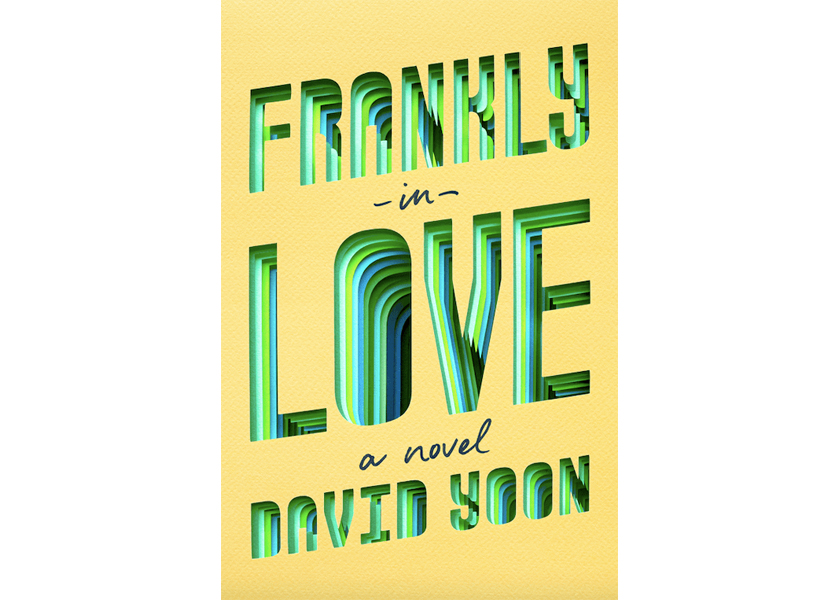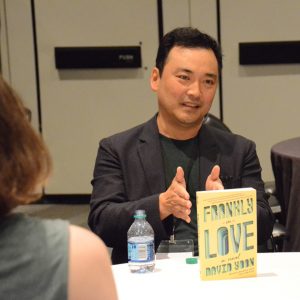Frankly in Love ~ By David Yoon
(Penguin Books London, 2019, ISBN# 978-0-241-37343-9)
Review by Joanne Rhim Lee (Spring 2020 issue)

Frank Li is a senior in high school in California, in the midst of the stressful college application season. He is a very good student and hangs out with the kids in theadvanced placement (AP) classes, whom he affectionally calls the “Apeys.” Though he has never had a girlfriend before, he begins hanging out with Brit, one of the girls in the group who he never seemed to notice before. All of a sudden, Frank is falling in love. He’s Frankly in Love. Get it?
Frank enjoys hanging out with Brit and her parents, who are young and hip. They ask Frank to address them by their first names. It is clear that they adore their daughter and trust her judgment in boys, politics, and whatever she wants to do with her life.
In contrast, Frank’s mother and father are stereotypical Asian tiger parents, hoping that he will get into “The Harvard” like his older sister Hannah, or at least a similar top-tier university. They are Korean American small business owners who work long hours at their convenience store, even though they earned college degrees and worked professional white-collar jobs in Korea.
First time novelist David Yoon clearly has some first-hand knowledge of first-generation Korean American parents, as he writes with comfortable familiarity about Korean American family gatherings, churches, food, and language. Frank’s dad is a man of few words, but he somehow manages to convey his love in short exchanges. When Frank asks for advice, his dad says, “Study hard, become doctor maybe.” In a humorously extended passage, Yoon even writes in Korean to describe an epically heated argument among parents, that their children (and many readers) clearly do not understand.
However, this story is not a love letter to first-generation Korean American parents. While Frank and Hannah are evolved, multi-dimensional characters, their parents are clearly not. After Hannah starts dating Miles, her equally successful African American boyfriend, her parents disown her, and their Korean American circle of friends are also shocked and saddened by Hannah’s poor decision-making skills.
Frank deeply misses his sister, but he also understands that no amount of arguing will change his parents’ racist views. He knows he has to hide his relationship with Brit, his new white girlfriend, or his parents will freak out. The only people who seem to understand his dilemma are the self-named Limbos, a group of young adult children of first-generation parents who all know one another.
Throughout their childhood, the “Limbo” kids (i.e., neither Korean nor American, but “in limbo” between cultures), along with their parents, met for monthly Korean dinners at one another’s homes, and the kids grew up together. The dinners allowed the families (particularly the parents) to have some respite time from the harsh new world of U.S. society.
Frank is a good son and wants to make his parents happy, especially after their hearts have been broken by his sister Hannah. Deep down, he understands why they are the way they are. Though he cringes when his parents make fun of Chinese people, saying “Chang-chong-ching-chong!” and “Piggy ear, piggy tail, chicken feet, everything they eating,” he knows the history of Korea and why his parents hate the Japanese and Chinese.
He also knows that his parents sacrificed everything to give his sister and him a better life in the U.S., and that they faced a lot of racism themselves when they arrived here. To survive, they built a little bubble of safety around themselves —- Korean friends, Korean TV shows, Korean food, etc. His parents have always hoped that their children would marry other Korean Americans and produce Korean American grandchildren who would also live within the bubble.
Out of the Limbos group, Frank has always connected with Joy Song, a whip-smart girl with whom he has a lot in common. Joy has been dating her Chinese American boyfriend for quite some time, though her parents have no idea that Wu exists. At one of the monthly gatherings, Joy confides in Frank that she and Wu have been arguing because he wants her to introduce him to her parents, but she has been resisting because she knows how they will respond. Frank understands exactly how she feels, and they bond over their shared dilemma. Since their parents are good friends, Frank and Joy hatch a plan to pretend to be dating each other, so that they can spend more time with Brit and Wu under newly-approved extended curfews.
This is a brilliant plan …until it isn’t. As Frank and Joy spend more time together planning their elaborate schedules and getaway plans, they realize that they actually really enjoy each other’s company. It doesn’t hurt that their parents are practically planning their wedding, and beaming at them as they fake-hold hands and drive away.
Like any teenager caught in a love triangle/square, Frank is deeply confused. He attempts to deconstruct the situation with his best friend Q, also an elite member of the Apeys club. He explains that he wishes he could be whoever he wanted to be and date anyone he wanted to date, and not have to live in his fake Korean American bubble.
Q completely understands. He tells Frank that his family is criticized for not being black enough, or for being too black. They both agree that there are no rules for being white, and that sometimes they wish they could be white, “without the actually being-white part.”
In knowing scenes like these, Yoon displays his light touch and humor, as well as his ease with his young adult readership. When Frank and Joy confess their plan to the other Limbos and ask them to keep it on the down-low, they readily agree. Frank replies, “Spank you, guys, I mean it. Hashtag Spanx.” Frank’s mom overhears, and asks, “Why spanking?”
Yoon’s story is not all humor; he also tackles some serious issues. Frank’s parents’ convenience store in the city is robbed one evening, and Frank’s dad is shot. Frank realizes that Brit’s uber-liberal parents are not as “woke” as they seem, as they don’t actually have any non-white friends or understand racism or classism outside their own intellectual bubble.
Most painfully, Frank’s family realizes that the sheltered Korean American community that they have worked so hard to create is not so ideal after all, and that even people who speak the same language and come from the same village in Korea are not necessarily true, ride-or-die friends.
When Frank and his friends graduate from high school, they must face the next phase of their lives as adults. They must navigate the messiness of relationships and also of race. Their parents might be scarred from past experiences, close-minded and even racist, but they have the chance to do things differently. Though this is David Yoon’s first novel, his Jamaican American wife Nicola Yoon is a well-known fiction writer (also in the young adult genre) of Everything, Everything and The Sun is Also a Star, both of which tackle inter-racial relationships and have been made into popular films. Clearly, these two authors have a lot to share, and here’s hoping they do more of it.

Korean Quarterly is dedicated to producing quality non-profit independent journalism rooted in the Korean American community. Please support us by subscribing, donating, or making a purchase through our store.


